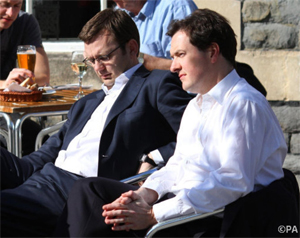Hacking trial highlighted the cosy relationship between politicians and the press
Posted by: Professor Richard Sambrook

Andy Coulson has been found guilty of phone hacking and his former boss, Prime Minister David Cameron, has been quick to apologise for “giving him a second chance” by employing the former News of the World editor after two of his employees were jailed for phone hacking in 2006.
Cameron swiftly issued a statement after the guilty verdict against his former director of communications was announced, saying: “Knowing what I now know it was obviously wrong to employ him. I gave someone a second chance and it turned out to be a bad decision.”
We’ll doubtless hear more of this, because – among its many colourful revelations – the phone hacking trial of Rebekah Brooks and Andy Coulson threw open more windows on the tangled relationships between the press and senior politicians.
We already had the Leveson revelations of pyjama parties at Downing St, encouraging texts between the then culture secretary, Jeremy Hunt, and James Murdoch over News Corp’s attempt to take full control of Sky and invitations to the prime minister to “country suppers” at Brooks’ home. Now we have details of personal phone calls from Tony Blair offering advice to Brooks in her hour of need, and further indications of the former News International bosses close relationships with those at the very top of the political ladder.
There’s nothing new in this of course. Former Daily Mirror editor, Piers Morgan, recounted in his memoirs:
Bored one evening I counted up all the number of times I had met Tony Blair. And the result was astonishing really, or slightly shocking – according to your viewpoint. I had 22 lunches, six dinners, six interviews, 24 further chats over tea and biscuits and numerous telephone calls with him.
It does seem an extraordinary tally.
As director of BBC News more than a decade ago, I met or spoke to the prime minister twice: once during an election campaign on the “battle bus” and once at a lunch for editors in Downing St. But then I always took the late columnist Hugo Young’s view that journalists and politicians should keep their distance – so was not too disappointed that invitations to tea or pyjama parties were not forthcoming. The point is, of course, that it’s the press that politicians seek to court, not a regulated public broadcaster.
Back door to power
Public concern over the close relationship between senior Murdoch executives and Downing St has receded in the wake of the Leveson inquiry – overshadowed by arguments over press regulation and by the Brooks-Coulson trial. But it was an issue Leveson himself was concerned about and made a number of observations in his report.
In response to Rupert Murdoch’s assertion that “I have never asked a politician for anything”, Leveson observed:
Sometimes the very greatest power is exercised without having to ask, because to ask would be to state the blindingly obvious and thereby diminish the very power which is being displayed. Just as Mr Murdoch’s editors knew the basic ground-rules, so did politicians.
Such power may have been overstated. The Sun declared it had won the 1992 election for the Tories with a triumphant front page. But at least one poll at the time suggested a majority of its readers thought it had backed Labour.
It’s the politicians who concede the power, as both David Cameron and Alastair Campbell admitted to Leveson – and as he recognised in his conclusions:
In some respects, the relationship between individual newspaper proprietors and senior politicians has not been wholly beneficial from the point of view of the public. I do not consider that the principle responsibility for remedying that situation lies with the proprietors.
And later:
The essence of the problem … is not just that politicians may have simply spent too much time and effort on the press, to the detriment of other claims on their attention to the conduct of public affairs. It is that, although it has not been their intention, politicians have risked actual or potential conflict of interest (via both fear and favour) and have done so in dealing with sources of influence which are, in themselves, powerful and unaccountable. The perception that politicians have done this out of public sight has diminished public scrutiny and accountability and run the risk of eroding public trust as the full facts emerge.
Leveson placed much emphasis on a 2011 amendment to the ministerial code, implemented and recommended by former cabinet secretary, Lord O’Donnell, to deal not only with actual conflicts, but the perception of conflicts: “The government will be open about its links with the media. All meetings with newspaper and other media proprietors, editors and senior executives will be published quarterly regardless of the purpose of the meeting.”
It’s hard to see – beyond encouraging and implementing a little more transparency – what else could be done. And, of course, we shouldn’t suppose that ministerial records will capture “country suppers”, pyjama parties or lengthy phone calls or texts. Imposed aggressive transparency is likely to just push the real business further underground.
But some transparency would be a start. So towards the end of the Leveson Inquiry I submitted a Freedom of Information request asking for details of the prime minister’s meetings with senior representatives of newspaper groups. I received a reply saying they were published quarterly on the Cabinet Office website and any further disclosure was exempt from the FOI Act as not being in the public interest.
(I submitted an informal request to Ed Miliband’s office for the same information and did not receive a reply of any kind).
Turning to the Cabinet Office website, extensive searches using a variety of terms, including those offered by the Cabinet Office, reveal one disclosure of the prime minister’s meetings with senior media leaders at Chequers from July 2011 – just after the amended ministerial code – and nothing since.
So much for the transparency of regular quarterly reports. If anyone can point me to any I have missed I’d be grateful. There are more up-to-date returns for other cabinet ministers and for special advisors – though no regular quarterly pattern that is discernable. They reveal names and dates of meetings and usually a topic such as “general discussion” or “discussion of departmental business.”
This is a shame. The UK has made commendable progress on open government – led by the Cabinet Office – yet in this one regard still seems shy of walking the talk. Mainstream politics has some way to go to assimilate the strengths of the open agenda.
In reality, press barons and politicians will always seek the mutual advantage of each others’ patronage – and have for a hundred years or more. But the phone hacking trial and Leveson inquiry have revealed that the embrace became too intimate. Although for the moment, both sides are wary of being seen to return to the old ways, it seems inevitable they will.
The only factors which may change it are the voters and readers. At least part of the current appeal of UKIP is its distance from the Westminster/media bubble. A protest vote at some level against closed “insider” politics and secret deals as much as policies. But the perceived influence of the press may outweigh any such concerns for the politicians.
In the longer term, the internet and digital services may break media near-monopolies and provide greater plurality of voice and transparency in doing so. But it’s a long game.
It leaves many of us feeling, as Hugo Young observed of the increasing enthusiasm of his newspaper colleagues to indulge in the spoils and perks of back-room politics: “I think there should be more austerity – isn’t journalism enough?”
This piece originally appeared in the The Conversation.

